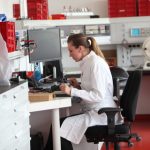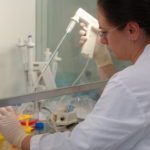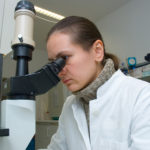
Researchers create ovulation on a chip
Researchers have created ovulation in the lab, with a simulated female reproductive system that behaves almost like the real thing over twenty eight days (New Scientist, 2017). Every twenty eight days, the ovary, cultured on a small plastic chip, releases an egg and starts producing hormones to prepare for pregnancy (Nature, 2017). The hormones travel … Continue reading Researchers create ovulation on a chip

Farmed chicken’s immune system “too slow” to beat campylobacter
University of Liverpool research has revealed that the immune response of farmed chickens does not develop fast enough to fight off campylobacter during their short lifespan (University of Liverpool, 2017). The findings have important implications in the challenge towards developing a poultry vaccine for the bug, which is the UK’s leading cause of food poisoning. … Continue reading Farmed chicken’s immune system “too slow” to beat campylobacter

Study looks at reason for improved head and neck cancer survival rates
In the first study of its kind researchers from the University of Liverpool’s Institute of Translational Medicine have examined the possible reasons for the improved survival rates for some head and neck cancer patients in the UK (University of Liverpool, 2017). A rising incidence of oropharyngeal squamous cell carcinoma (OPSCC), a type head and neck … Continue reading Study looks at reason for improved head and neck cancer survival rates

University of Manchester to receive £1.2m for pancreatic cancer research
University of Manchester scientists are set to receive £1.2m from Cancer Research UK to help transform pancreatic cancer treatment in the UK (University of Manchester, 2017). Cancer Research UK is investing a total of £10m in the PRECISION Panc project based in Glasgow, Manchester and Cambridge, which aims to develop personalised treatments for pancreatic cancer … Continue reading University of Manchester to receive £1.2m for pancreatic cancer research

Study finds moderate drinkers not as risk when taking methotrexate
A new study has found people taking methotrexate, a common rheumatoid arthritis medicine, are not at increased risk of liver damage if they stick to fourteen units of alcohol a week or less (University of Manchester, 2017). Methotrexate is a drug taken, often over long periods of time, to limit or prevent joint damage and … Continue reading Study finds moderate drinkers not as risk when taking methotrexate

Humans need metal to maintain strong bones, just like Wolverine
An international team of researchers, led by the University of Manchester, has used the Diamond Light Source to image the precise location and chemistry behind the growth in bone for the first time (University of Manchester, 2017). Their research has provided fresh insight into how bones grow and develop, and how the traces of metal … Continue reading Humans need metal to maintain strong bones, just like Wolverine

Study finds no “weekend admission effect” for elderly patients with broken hips on the NHS
New research has found NHS patients admitted to hospital at the weekend with a hip fracture are at no greater risk of death compared to patients admitted on weekdays (University of Bristol, 2017). In fact, the risk of death during the hospital stay was lower at the weekend than in the week. Using data collected … Continue reading Study finds no “weekend admission effect” for elderly patients with broken hips on the NHS

Researchers aiming for faster, more effective TB diagnosis
Oxford University researchers, in partnership with Public Health England (PHE), will lead a new worldwide collaboration called CRyPTIC to speed up diagnosis of TB (University of Oxford, 2017). TB infects nearly 10 million people each year and kills 1.5 million, making it one of the leading causes of death worldwide. Almost half a million people … Continue reading Researchers aiming for faster, more effective TB diagnosis

Immortalised cell lines could make red blood cell manufacture more efficient
University of Bristol researchers have generated the first immortalised cell lines which allow more efficient manufacture of red blood cells (University of Bristol, 2017). The team, from the University of Bristol and NHS Blood and Transplant, were able to manufacture red blood cells in a more efficient scale than was previously possible. The results, published … Continue reading Immortalised cell lines could make red blood cell manufacture more efficient

New drug proven to reduce your risk of dying from a heart attack or stroke
A pioneering new drug has been clinically proven to reduce the chance of someone dying from a heart attack or stroke (WalesOnline, 2017). Following a worldwide trial involving 27,500 high risk patients, evolocumab, also known as Repatha, was found to radically lower cholesterol levels. The study, which included scientists at Swansea University, found that evolocumab … Continue reading New drug proven to reduce your risk of dying from a heart attack or stroke








